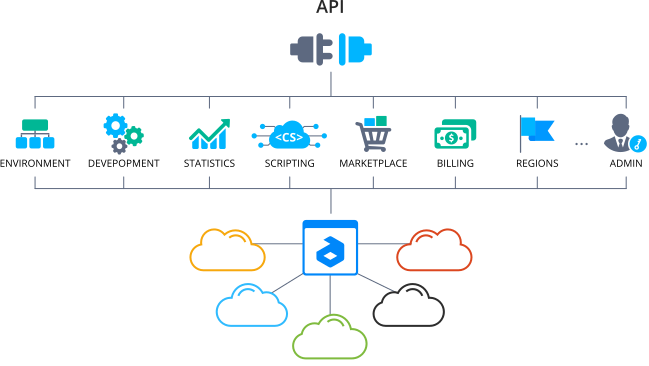Introduction to Cloud API
In today’s digital landscape, businesses and developers increasingly rely on seamless communication between systems, applications, and platforms. Cloud APIs (Application Programming Interfaces) play a pivotal role in enabling this interaction. A Cloud API provides a set of tools and protocols that allow developers to connect software applications to cloud-based services efficiently. This enhances functionality, ensures smooth data exchange, and accelerates digital transformation across diverse industries.
Understanding How Cloud APIs Work
Cloud APIs serve as intermediaries that facilitate data transmission and command execution between client devices and cloud platforms. These APIs expose functionalities of cloud services—such as storage, computing, and networking—so that developers can use them without building solutions from scratch. Most Cloud APIs operate over HTTP/HTTPS using REST or SOAP protocols, making them easy to integrate with web and mobile applications. By enabling apps to pull data or services from cloud infrastructure, APIs drastically simplify development processes.
Benefits of Using Cloud APIs
Cloud APIs offer a multitude of advantages for developers and enterprises alike. First and foremost, they enhance scalability. With a cloud-based API, applications can access scalable computing resources, adapting quickly to changes in user demand. Secondly, Cloud APIs improve flexibility by allowing developers to pick and choose specific services from different cloud providers and integrate them as needed. Additionally, these APIs support faster deployment of applications by minimizing the need for manual coding and infrastructure management. Lastly, robust Cloud APIs also offer high levels of security through encryption and access control measures, ensuring safe data exchange.
Types of Cloud APIs
There are several types of Cloud APIs that cater to specific functions within cloud environments. Infrastructure APIs enable developers to manage computing resources like virtual machines and storage. Platform APIs offer access to software development frameworks hosted on cloud platforms, streamlining the coding and testing process. Software APIs connect different applications and services, such as customer relationship management (CRM) and enterprise resource planning (ERP) systems. Finally, Storage APIs are designed for file management, enabling secure upload, download, and access control of data stored in the cloud.
Key Use Cases of Cloud APIs
The flexibility and versatility of Cloud APIs have led to their adoption across various domains. In the finance sector, APIs allow real-time access to transaction data, enabling faster processing and improved customer experience. In healthcare, Cloud APIs support seamless exchange of patient records between systems, improving efficiency and reducing errors. For e-commerce, APIs enable integration of payment gateways, inventory management, and customer service tools. In mobile app development, Cloud APIs are essential for syncing data, enabling push notifications, and integrating with third-party services like social media or maps.
Security in Cloud API Usage
Security remains a top priority when using Cloud APIs, as these interfaces often handle sensitive data. Authentication mechanisms like API keys, OAuth tokens, and multi-factor authentication (MFA) ensure that only authorized users gain access. Encryption protocols such as SSL/TLS are used to secure data during transmission. Moreover, rate limiting and usage throttling help prevent abuse and distributed denial-of-service (DDoS) attacks. Developers must also follow best practices like regular key rotation, detailed logging, and access control policies to safeguard applications using Cloud APIs.
Best Practices for Cloud API Integration
For successful Cloud API implementation, developers must adhere to certain best practices. Documentation is key—comprehensive and up-to-date API documentation reduces integration errors and improves developer productivity. Monitoring and analytics tools help track API performance, detect issues, and ensure optimal uptime. Version control allows teams to manage updates without disrupting existing services. It's also vital to test APIs thoroughly under real-world conditions to avoid unexpected failures. Leveraging SDKs (Software Development Kits) provided by cloud providers can further simplify integration.
Popular Cloud API Providers
Several major cloud service providers offer robust and widely adopted APIs. Amazon Web Services (AWS) provides APIs for services such as S3 (storage), EC2 (computing), and Lambda (serverless). Google Cloud Platform (GCP) offers APIs for machine learning, big data, and app development. Microsoft Azure delivers a comprehensive API suite for IoT, databases, and AI services. Additionally, platforms like Twilio, Stripe, and Firebase specialize in specific functionalities like communication, payments, and mobile development respectively—each offering powerful APIs that plug directly into cloud environments.
Future of Cloud APIs
As technology evolves, Cloud APIs are expected to become even more intelligent, scalable, and interconnected. The rise of microservices architecture, serverless computing, and artificial intelligence is pushing API development toward greater automation and personalization. APIs will increasingly support real-time data processing, low-latency connections, and enhanced analytics. With businesses striving for agility and digital connectivity, Cloud APIs will remain at the heart of innovation, powering everything from smart devices to enterprise-grade applications.
Read More - https://www.marketresearchfuture.com/reports/cloud-api-market-2572
Conclusion
Cloud APIs have redefined how software communicates with cloud services, offering a reliable, secure, and scalable way to connect applications and services across environments. Their role in digital transformation is undeniable, enabling faster development, smoother integration, and more dynamic user experiences. As organizations continue to shift toward cloud-native solutions, mastering Cloud API usage will be a critical step in staying competitive and innovative in the digital age.
 Free IL
Free IL


